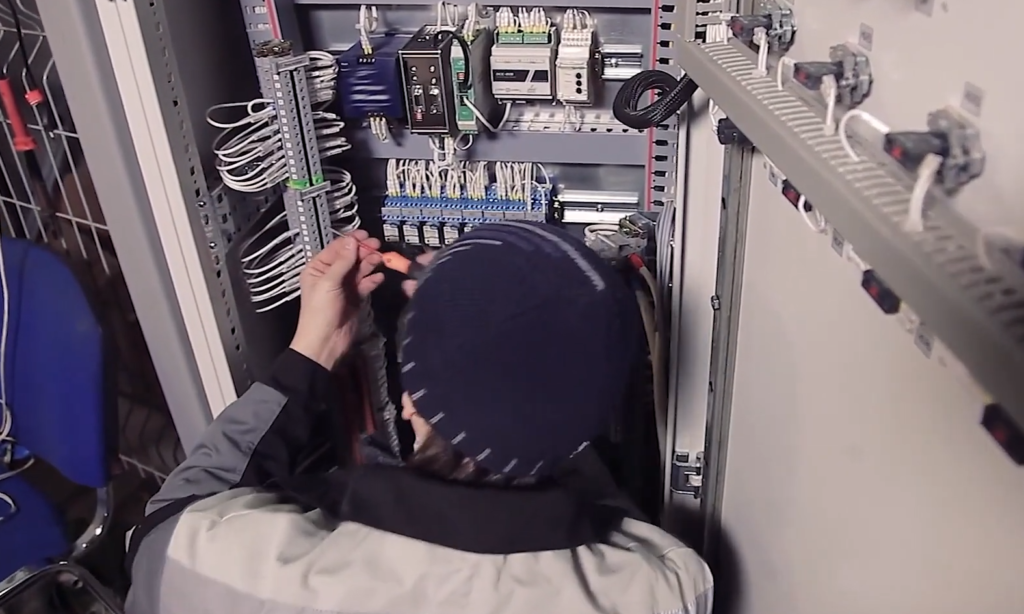Do you know the difference between an electrician and an electrical engineer? Many people don’t, but there is a big distinction between the two.
If you are thinking about becoming an electrician or an electrical engineer, it’s important to understand the differences between the two careers. In this blog post, we will discuss the similarities and differences between these two professions!
What Do Electrical Engineers Do?
Electrical engineers have a higher level of education, typically holding a bachelor’s degree in electrical engineering. They are responsible for creating and designing new electrical systems, as well as improving existing ones.
This may include power generation equipment, wiring in buildings, lighting systems, and communication technologies. Electrical engineers often work in research and development, testing and evaluating new equipment before it is put into use [1].

Can An Electrical Engineer Work As An Electrician?
While electrical engineers possess the knowledge and skills necessary to work as an electrician, they usually do not perform this type of hands-on work. An electrical engineer typically works in a more administrative role, while electricians are responsible for physically installing and repairing electrical systems.
Also, to become an electrician, you must have a license in most states. This requires completing an apprenticeship and passing a certification exam, which electrical engineers may not have completed.
They often work with blueprints and technical drawings to install wiring, circuit breakers, transformers, and other equipment. Electricians also inspect existing electrical systems to ensure they are functioning properly and comply with safety codes. Additionally, they may perform repairs or make upgrades to improve the efficiency of a system [2].
Do Electricians Make Good Money?
Electricians can earn a good wage, with the Bureau of Labor Statistics reporting a median salary of $55,190 in 2022. However, it is important to note that electricians often work long hours and may need to be on call for emergency repairs. Additionally, electricians must undergo ongoing training and education to keep their license current.
To become an electrician, you typically need to complete a formal apprenticeship program lasting four or five years. You will also need to pass licensing exams in order to work as an electrician in most states. Some community colleges offer certificate programs that can help prepare individuals for the apprenticeship program and licensing exams [3].

What’s The Highest Paying Electrical Job?
According to the Bureau of Labor Statistics, the median salary for electrical engineers was $97,970 in 2022. Other high-paying jobs in the electrical industry include power plant operators and electrical and electronics installers and repairers [4].
Key Differences Between Electrician And Electrical Engineer
The Job Description
An electrician focuses primarily on the installation and maintenance of electrical systems. This can include wiring in a new building or troubleshooting an issue with a current system.
An electrical engineer, on the other hand, designs and develops new electrical equipment, as well as manages the installation and testing of electrical systems. They may also work to improve existing technology.
To become an electrician, individuals typically complete a vocational training program or apprenticeship and are required to have a license in their state. Electrical engineers usually hold at least a bachelor’s degree in the field and may be required to be licensed professionals as well.

Work Environment
An electrician may work in a variety of settings, from residential homes to commercial buildings and industrial facilities. They may also work outdoors on power lines or other electrical infrastructure.
An electrical engineer often works in an office setting, but may also visit job sites for research or troubleshooting purposes.
And while an electrician typically works with their hands, using tools and equipment to install and repair systems, the electrical engineer often spends more time working with computer software and conducting research.
Salary and Career Outlook
According to the Bureau of Labor Statistics, the median annual salary for electricians was $55,190 in 2018. The demand for electricians is expected to grow 9% from 2018 to 2028, faster than the average for all occupations.

The median annual salary for electrical engineers was $99,070 in 2022. Employment opportunities for electrical engineers are projected to grow by 4% from 2018 to 2028 [5].
Electricians and electrical engineers both play important roles in the field of electricity. By understanding the key differences between the two careers, individuals can make informed decisions about their future professional path.
Type Of Education/Qualification Required
While electricians typically only need a high school diploma or equivalent, an electrical engineer usually needs at least a bachelor’s degree in electrical engineering or a related field. Both electricians and electrical engineers may also be required to obtain licensing in their state.
Electricians often gain experience through apprenticeships, while aspiring electrical engineers may participate in internships to acquire hands-on experience.
The job responsibilities and career paths of electricians and electrical engineers differ significantly, but both play integral roles in the field of electricity. Understanding these key differences can help individuals make informed decisions about their professional path.
Electrician Vs. Electrical Engineer: Understanding The Pros And Cons
Pros Of Becoming An Electrical Engineer
- Higher salary potential;
- More career options and opportunities;
- Ability to work in a variety of industries;
Pros Of Becoming An Electrician
- More practical, hands-on work experience;
- Can enter the field with less education and training;
- Opportunities for self-employment and starting your own business;
So what’s the difference between an electrician and an electrical engineer? Simply put, an electrician primarily focuses on the installation and maintenance of electrical systems and equipment. On the other hand, an electrical engineer designs and develops new electrical equipment, as well as improves upon existing technology.
While both professions require knowledge of electricity and wiring, a career as an electrical engineer requires more education.
What Are The Disadvantages Of Becoming An Electrical Engineer
- The job can be physically demanding, as it often involves working in tight spaces or on tall structures;
- It requires a considerable amount of education and training to become an electrical engineer, including obtaining a bachelor’s degree in the field;
- This career also requires continuous learning and staying up-to-date with changes in technology;
- The job market for electrical engineers may experience fluctuations, as it is heavily dependent on industries such as construction and manufacturing;

What Are The Disadvantages Of Becoming An Electrician
- Physical demands and risks are also present in the job of an electrician, such as working with live wires;
- The education and training requirements for becoming an electrician may not be as extensive as those for becoming an electrical engineer;
- Job opportunities for electricians may also fluctuate, as they rely on industries such as construction and home renovation;
- Electricians may not always have the opportunity to work on complex or innovative projects, compared to electrical engineers;
Overall, it is important to consider the demands, education requirements, and job market of both careers before making a decision. It may also be beneficial to speak with professionals in the field to gain insight into their experiences. Ultimately, it is up to each individual to weigh the advantages and disadvantages and decide which career path is the best fit for them.
Can An Electrician Become An Electrical Engineer?
While electricians and electrical engineers both deal with electricity, the job responsibilities and education requirements for each profession differ significantly.
They typically receive their training through apprenticeship programs or technical schools.
On the other hand, electrical engineers design, develop, test, and oversee the production of electrical equipment, such as electric motors, navigation systems, and power generation equipment. They usually have a bachelor’s degree in electrical engineering from an accredited university program [6].

An electrician can certainly become an electrical engineer by obtaining the necessary education and experience. However, it may not be as straightforward as enrolling in a university program since most engineering positions require several years of experience in the field.
FAQ
What’s the difference between an electrical engineer and a master electrician?
An electrical engineer typically has a college degree in the field and is responsible for designing and implementing complex electrical systems.
A master electrician, on the other hand, usually has years of on-the-job training and experience and is licensed to install and maintain electrical systems according to code requirements.
Can a master electrician design electrical systems?
In most cases, no. It would require additional education and licensing to be able to perform this type of work as an engineer. However, they may be able to provide input or offer suggestions based on their practical experience with existing systems. Also, some states do allow licensed electricians to obtain a “design-build” license, which allows them to design electrical systems within certain parameters.
Can an electrical engineer perform hands-on work as an electrician?
It depends on their level of training and experience. Some electrical engineers may have worked as electricians before or during their education and may be capable of performing hands-on tasks.
However, in most cases, it would require additional licensing and certification for an engineer to legally perform electrical work. It is also important to note that even with the necessary qualifications, an engineer may not possess the same level of practical skills and knowledge as a trained and experienced electrician.
Can an electrical engineer wire a house?
It depends on the individual’s experience and training. Some electrical engineers may have hands-on experience with wiring, while others may primarily work with designing systems or managing projects. It would also require proper licensing to legally perform this type of work.
Electrical engineers and master electricians both play essential roles in the industry, but their specific duties and responsibilities can vary depending on their education, experience, and licensure.
Are electrical engineers in demand?
Yes, the demand for electrical engineers is expected to grow in the coming years. This can be attributed to a growing need for technological advancements and improvements in infrastructure. Electrical engineers may also be needed to work on renewable energy projects or integrate smart technology into systems [7].
Is electrical engineering hard?
Like any engineering field, electrical engineering requires dedication and a strong understanding of complex principles and concepts. It can be challenging at times, but also rewarding as you use your knowledge to create and improve upon electrical systems. Additionally, staying up-to-date on the latest technology and advancements in the field is important for success in this career.
Is electrical engineering a good career?
It can be a fulfilling and secure career choice, especially with the predicted growth in demand for electrical engineers. It also offers opportunities to work in a variety of industries and constantly solve new challenges. However, as with any career path, it’s important to consider your personal interests and skills before making a decision [8].
Which is more difficult – electrical or electronics engineering?
This can vary for different individuals and is ultimately subjective. Both fields require a strong understanding of electricity and related concepts, but electronics engineering may involve more specific knowledge in areas such as semiconductors and circuits. It’s important to do research and consider your own strengths before choosing one over the other.
Can you be an electrical engineer and electrician at the same time?
It would depend on the individual’s education, experience, and licensure. It may be possible for someone to have both roles, but they would need to meet the requirements and stay current in both fields. Additionally, there may be certain limitations or restrictions when it comes to performing tasks as both an engineer and an electrician at the same time.
What do electrical engineers actually do?
Electrical engineers design, develop, test, and supervise the manufacture of electrical equipment. This includes things like power generation equipment, electric motors, communication systems, and power distribution systems. They often work in a variety of industries including construction, manufacturing, transportation, and communications [9].
What do electricians do?
Electricians install and maintain electrical systems in homes, businesses, and factories. They may also work on construction projects to install new electrical systems or make repairs to existing ones. Electricians typically receive hands-on training through apprenticeship programs or technical schools.
How much do electricians make?
Electricians typically make an average salary of $55,190 per year [10]. They install and maintain electrical power, communications, lighting, and control systems in homes, businesses, and factories. And while they do work with electrical components, their job primarily focuses on the practical application and installation of these systems.
So while electricians are skilled in installing and maintaining electrical systems, electrical engineers focus more on designing and developing new equipment. Both professions require a high level of technical knowledge and expertise in the field of electricity, but the scope of their work differs significantly.
While electricians focus on the practical application and installation of electrical systems in homes and businesses, electrical engineers focus on designing and developing new electrical equipment and technology. And while both professions require a high level of technical knowledge and expertise in electricity, their career paths differ significantly.
How much do electrical engineers make?
On the other hand, electrical engineers often have a higher level of education and specialized training. They design, develop, test, and supervise the manufacturing of electrical equipment such as electric motors, radar and navigation systems, communications systems, and power generation equipment. Their average salary is $97,970 per year.
So while electricians primarily focus on the practical application and installation of electrical systems, electrical engineers are responsible for designing and developing new equipment and technology. Both play important roles in the industry, but there is a clear distinction between job duties and education requirements.
Is electrical engineering a lot of math?
As an electrical engineer, you will need to have strong math skills, as the job requires analysis and problem-solving using mathematical equations. However, not every task will require heavy math usage. It really depends on the specific job responsibilities and projects that an electrical engineer is working on.
An electrician primarily focuses on installing and maintaining electrical systems in buildings. They may also do the wiring for construction projects. An electrical engineer, on the other hand, designs and develops new electrical equipment, such as motors and navigation systems. They may also work on improving existing technology or solving technical problems.
Do electrical engineers use a lot of math?
Both electricians and electrical engineers use math on a daily basis to solve problems related to electricity. However, electrical engineers tend to use advanced mathematical principles more often than electricians, as they are often involved in complex design and development projects.
Are electricians just skilled tradespeople?
Electricians and electrical engineers both work with electricity, but they have different areas of expertise. Electricians are primarily responsible for installing and maintaining electrical systems in buildings or structures. These tasks include wiring, circuit breakers, and equipment installation.
On the other hand, electrical engineers design and develop new electrical equipment or systems. This can involve creating blueprints, conducting experiments and tests, and analyzing data. Electrical engineering also includes research and development in fields such as telecommunications, power generation, and computer technology.
Do electricians wire buildings?
The main difference between an electrician and an electrical engineer is the scope of their work. Electricians primarily focus on installing and maintaining electrical systems in residential, commercial, or industrial buildings. They may also specialize in certain types of electrical work, such as telecommunications or security systems.
On the other hand, electrical engineers design and develop new electrical equipment, oversee the manufacturing process, and evaluate the effectiveness of equipment and systems. In addition to having a strong understanding of electricity and electronics, they often use complex mathematical equations to analyze and solve problems.
What is the easiest engineering?
While both electricians and electrical engineers work with electricity, there are significant differences in the scope of their work. Electricians primarily focus on the installation and repair of electrical equipment and systems. An electrical engineer, on the other hand, typically designs and develops new electrical equipment or solves problems with existing equipment.
In terms of education and training, electricians usually complete a vocational program or apprenticeship, while an electrical engineer typically has a bachelor’s degree in engineering. In addition, electricians may be licensed by their state or municipality while an electrical engineer commonly holds a professional engineering license.
What is the highest-paid electrical engineer?
There is no definitive answer to this question as salary can vary depending on factors such as experience, location, and industry. However, the top 10% of electrical engineers in the United States earned a median salary of $137,720 in 2022. In addition, industries such as aerospace and computer system design tend to offer higher salaries for electrical engineers.
Is electrical engineering easy to study?
While both electricians and electrical engineers work with electricity, their roles and responsibilities differ significantly. Electricians are tradespeople who primarily focus on installing and maintaining electrical systems in residential or commercial buildings. They often work in construction or maintenance settings, following plans and conducting hands-on tasks to install wiring, outlets, lighting fixtures, and other equipment.
On the other hand, electrical engineers design complex electrical systems for various industries, including power generation, transportation, communications, and manufacturing. They use computer-aided design (CAD) software to create schematic diagrams and analyze potential risks. Electrical engineers also oversee the installation process of their designs and may provide guidance to electricians during this phase.
Do electrical engineers write a lot?
While writing is a part of an electrical engineer’s job, it is not a significant portion. Electrical engineers may need to write reports, technical documents, and proposals, but they primarily focus on designing and analyzing electrical systems. Electricians also do some writing in their job, such as filling out work orders or completing paperwork for building permits.
The main difference between electricians and electrical engineers is the scope of their work – electricians typically focus on practical, hands-on tasks while electrical engineers have more theoretical and design-based responsibilities.
Both professions require technical knowledge and skills, but pursuing a degree in electrical engineering may offer more opportunities for advancement and higher salary potential. It should be noted that becoming an electrician does not necessarily require a college degree, while most electrical engineering positions require at least a bachelor’s degree in the field.
Which engineering branch is the toughest?
While both electricians and electrical engineers work with electricity, there are key differences in their day-to-day tasks and career paths. Electricians primarily install, maintain, and repair electrical systems in residential and commercial buildings. They may also work on construction projects or with industrial machinery.
On the other hand, electrical engineers design and develop new electrical equipment, such as motors and navigation systems. They often work in research laboratories and offices, using computer simulations to test their designs before they are built and implemented.
Useful Video: Residential Electricians Vs Commercial Electricians.. What Should You Do!?
References
- https://www.indeed.com/career-advice/finding-a-job/electrician-vs-electrical-engineer
- https://allthedifferences.com/difference-between-electrician-and-electrical-engineer/
- https://csgelectric.ca/difference-between-electrician-electrical-engineer/
- https://findthehomepros.com/electrician-vs-electrical-engineer-whats-the-difference/
- https://www.plcgurus.net/electrical-engineer-vs-electrician/
- https://www.neit.edu/blog/electrician-vs-electrical-engineer
- https://findthehomepros.com/electrician-vs-electrical-engineer-whats-the-difference/
- https://www.plcgurus.net/electrical-engineer-vs-electrician/
- https://www.neit.edu/blog/electrician-vs-electrical-engineer
- https://www.indeed.com/career-advice/finding-a-job/electrician-vs-electrical-engineer














Leave a Reply